When Alexis de Tocqueville visited the US, he observed that America was more religious than Europe and attributed it to the strong separation of church and state that existed in the US. It would seem that this division of church and state, this freedom of religion is currently being tested. This is of particular concern currently because Christians of any denomination no longer represent 99% of the public. Many are talking of the erosion of religious freedom in the US. Those who express such concerns are inevitably Christian.
The perceived erosion of religious freedom today is the very real erosion of Christian privilege.
I’d like to address a list of both real events (held up as examples of the erosion of religious freedom) and hypothetical threats to religious freedom.
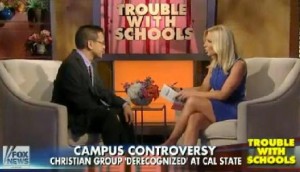
- The University of California system is forcing Christian groups to compromise their religious conscience if they want recognition for their clubs.
So, a public, tax-funded University won’t officially recognize and subsidize a club that excludes gays and non-Christians from leadership. Is this an erosion of religious freedom? Well, the group is totally at liberty to remain a private club, unaffiliated with the university. The issue seems to be, do they have a religious freedom to be put on a list of clubs at a public University and receive funds from the University if they discriminate using a religious rubric? This seems to be a case of the erosion of Christian privilege, not religious freedom.
- Houston city government lawyers subpoenaed the sermons and notes of pastors who opposed parts of a new law on religious grounds. These pastors faced not only intimidation, but also criminal prosecution for insisting that a new gay rights ordinance should be put to a vote of the people.
They were subpoenaed simply because they opposed a law? No, not quite. Sermons and notes were subpoenaed because the city was being sued by a Christian group for throwing out illegal signatures on a petition to repeal the equal rights law. Those 5 pastors were among the organizers who gathered signatures to repeal an equal rights law. The city determined that thousands of the signatures were invalid, because legally the signature had to be “accompanied by the printed name, address, voter registration number or date of birth and the date signed; additionally, anyone who collected signatures must also have personally signed the petition, and have appeared before a notary to acknowledge under oath that the signatures were made in their presence.” Turns out those collecting many of the signatures didn’t follow the legal requirements. In reaction to this, a Christian group filed a suit against the city for throwing out the invalid signatures. In preparation for the upcoming suit, the city lawyers subpoenaed records relating to the petition process. However, the language used in the subpoenas was too broad and led many religious groups to express concern that the government was requesting their sermons. The language of the subpoenas was narrowed to more precisely represent their intentions. The pastors weren’t facing criminal prosecution for insisting that a repeal should be put on the ballot. They weren’t facing criminal prosecution at all (unless they decided to not comply with the law by refusing to give documents related to the repeal petition, all because of the suit filed by Christian groups angry that illegally collected signatures were thrown out).
I’m willing to go out on a limb and say that if an Imam at a Mosque was advocating members to vote to force women to cover their hair and face, the Imam was an organizer collecting petitions to put it on the ballot, didn’t follow legal protocol, then a Muslim group sued the city for throwing out the petition, then the government subpoenaed the Mosque for records on the petition process, the public wouldn’t even blink at those subpoenas. In fact, the public might even be angry if the mayor narrowed the scope of them.
- An Olympic gold-medal gymnast was pressured to resign as the symbolic head of the team because gay rights advocates protested that he had supported Proposition 8 in California.
Peter Vidmar was appointed by the US Olympics Committee as the head of delegation for the 2012 Olympics. His $2,000 dollar donation to Prop 8 led many people to protest the appointment. However, the USOC “reaffirmed its faith in Vidmar” and was willing to proceed despite the protests. I’m not clear on how this is an example of the erosion of religious freedom. If they had appointed someone who donated thousands to legalizing abortion, would you be surprised if there were protests? (especially if the legislation had won) Additionally, this is a person selected to represent our country in the olympics. I would hope that the public is allowed to voice their opinions on the matter without it being perceived as somehow violating Vidmar’s freedom of religion.
- Brendan Eich was forced to resign as CEO of Mozilla in a similar well-publicized backlash to his personal beliefs.
First of all, Eich chose to resign. Second, if he did receive pressure, it was not without reason. Mozilla is founded on an open-source platform, which means that community and collaboration is at the heart of it. Because Eich actively worked to deny people the right to marry, many within the company and collaborators without had a problem with him as CEO. Three board members resigned in response to his appointment (or maybe I should say they were “forced to resign”). Executive chairwoman Mitchell Baker more or less articulated what the church leaders did recently regarding the balance of honoring freedom of speech and equality in response to Eich’s resignation. Freedom of speech and freedom of religion do not mean freedom from criticism. They don’t mean freedom from having public opinion be against those who try to set up and protect discriminatory legislation.
- A Baptist-affiliated organization that places at-risk children in adoption or foster care terminated an employee because her admitted homosexual lifestyle was contrary to the organization’s core values. Accusing the organization of sexual orientation discrimination, she brought a federal lawsuit that the organization is still defending against more than a decade later. Pedreira v. Kentucky Baptist Homes for Children, Inc., 579 F.3d 722 (6th Cir. 2009), cert. denied, 131 S. Ct. 2091.
This is a public organization which receives government funding for their work. Regardless, this isn’t an erosion of religious freedom, it is application of anti-discrimination laws for public organizations.
- A New York City restaurant was ordered to pay $1.6 million to a lesbian chef and manager for allegedly discriminating based on sexual orientation and religion because the restaurant held weekly prayer meetings and the owner expressed the view that homosexual conduct is sinful. Salemi v. Gloria’s Tribeca, Inc., 115 A.D.3d 569, 982 N.Y.S.2d 458 (N.Y. Ct. App. 2014).
Yet again, this is a public restaurant. If they want to be allowed to make the staff have regular religious rituals and say things like “gay people are going to hell” and tell their lesbian employees to “to dress more “effeminately,” and that she should marry a man and have children” then be a private restaurant. No one is stopping them from doing that. The problem is that they want the privilege to do that AND be able to do public advertising. If we don’t like the fact that a public organization isn’t allowed to discriminate, then be mad at the South for the overt racism which led to these laws. I think these laws are important, others may disagree. If you view these laws regarding public organizations as eroding religious freedom, then you probably should have been fighting against them for decades now.
- A Minnesota health club, owned by Evangelical Christians and operated in light of biblical principles, was ordered by the Minnesota Supreme Court in 1985 to stop hiring only employees who shared their religious beliefs in order to comply with state nondiscrimination laws. Blanding v. Sports & Health Club, Inc., 373 N.W.2d 784 (Minn. Ct. App. 1985), aff’d, 389 N.W.2d 205 (Minn. 1986).
Yet again, if they were willing to become a private club instead of a public club, they could continue discriminating based on religious views. They elected not to do so.
- A private Jewish university in New York City was sued by a lesbian couple for its policy of reserving its married student housing for male-female couples. The state’s highest court ruled that the university’s policy could be challenged as violating the city’s ordinance barring housing discrimination based on sexual orientation. Levin v. Yeshiva Univ., 96 N.Y.2d 484 (2001).
Yeshiva University does have a rabbinical school, which is exempt from this type of legislation because it is a religious school. However, the Yeshiva University lawsuit concerned student housing at the Albert Einstein College of Medicine, which is owned by Y.U.. Albert Einstein College isn’t a religious school — it’s a secular medical school which accepts students regardless of ethnicity or religion, says nothing about religion or faith in its mission statement, and which prides itself on diversity.
- In 1996 the California Supreme Court ruled that a devout Presbyterian widow with traditional Christian morals violated state law when she desired to rent one of her properties only to couples who are married. The court explained that the widow could avoid compromising her religious beliefs by getting out of the rental business altogether. Smith v. Fair Employment & Housing Com., 913 P.2d 909 (Cal. 1996).
Housing discrimination is considered to be more of a violation of rights than the right to discriminate based upon one’s religion. Even the LDS church has come out in favor of LGBT housing discrimination laws. If you don’t want to rent to some specific group of people, don’t publicly advertise your rental property.
- Religious rights, such as the right to teach their beliefs from the pulpit and in church classrooms, share their views openly in the public square, select their own leaders, and minister to their members freely are being eroded.
I’m not aware that this is under attack anywhere in the US. Unless we are talking about instances in which a religious group is acting using public funds or in direct affiliation with politics/government, in which case it is more accurately described as the erosion of Christian privilege, not rights. (I’m also intrigued at the inclusion of the religious right to ‘select their own leaders’ given that in several religions there is no selection process for individuals)
- The right to use church properties in accordance with their beliefs without second-guessing from government.
This is also not even close to being under attack. This only becomes an issue when the church begins engaging in political activity. If that occurs, then the church still has the freedom to do so, but it could lose the privilege of not paying taxes. The tax-free status of a church is not a right, it is a privilege granted them so long as the church functions as a church, not as part of political machinery.
- Church freedom regarding employment, honor code standards, and accreditation at church schools.
A private school is free to discriminate, create its own honor code, etc. However, if the school wants to receive public funding, it has to recognize that it comes with strings attached, namely the equal treatment of people. Accreditation at schools, as I understand it, has more to do with demonstrating the quality of the instruction and the scope of the material covered. If there are instances of religious schools being denied accreditation because of the religion I’d love to hear about it and I will join voices in defending the right of the religious school to be accredited based on the quality and scope of its education.
- Church-owned businesses or entities that are directly related to the purposes and functions of the church must have the same latitude in employment standards and practices as the church itself.
My understanding is that so long as the business isn’t “open to the public” it can discriminate as it sees fit. Also, this line of thinking seems like it could lead to weird places if taken very far. This seems to be very much tied to the Hobby Lobby case. It would seem that the desire is to allow discrimination in a large number of areas by simply labeling the entity as a “religious” one. If you can label it religious, you don’t need to allow equal rights.
- Certainly, religious rights must include a family’s right to worship and conduct religious activities in the home as it sees fit, and for parents to teach their children according to their religious values—recognizing that when children are old enough they will choose their own path.
I’m again wondering where this is under attack. Where is the city/state government that has passed a law that parents can’t teach their children their religious beliefs?
- This would include living in accordance with their deeply-held religious beliefs, including choosing their profession or employment or serving in public office without intimidation, coercion, or retaliation from another group.
Does this mean the right to act according to one’s religion without anyone vocally opposing it/protesting it? This again seems to be much more accurately described as Christian privilege as opposed to religious rights.
- The right to conscientiously object. For example, a Latter-day Saint physician who objects to performing abortions or artificial insemination for a lesbian couple should not be forced against his or her conscience to do so, especially when others are readily available to perform that function. As another example, a neighborhood Catholic pharmacist, who declines to carry the “morning after” pill when large pharmacy chains readily offer that item, should likewise not be pressured into violating his or her conscience by bullying or boycotting.
There are many conscientious objector (CO) laws. Some are calling for them to be amended/removed. However, while there are more extreme voices calling for the removal of CO laws (esp. regarding abortion), there are many other pro-choice groups who agree that forcing a doctor to act against their conscience is an affront to a liberal society, just as denying a woman access to medical care is.
If the voices of a few constitute an attack on liberties, then all of our liberties are under attack. Literally all of them. I don’t think that people actually want freedom of religion to mean freedom from criticism and boycotting. I do think that often a specific religious group wants the freedom of religion to mean that they are free from criticism and boycotting. The trouble is that freedom of religion applies to all religions. Some religions believe in marriage equality and thus criticism of homosexuality is criticism of their religion. Freedom of religion must apply to all religions. Christianity has enjoyed many privileges in America, some of which are being eroded in the shift to treating all people and all religions equally. I would echo the desire of many that as we engage in these discussions that we do so with respect and civility.

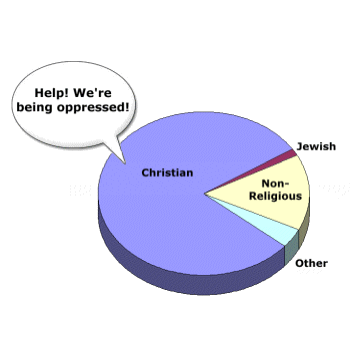
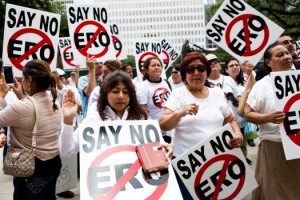


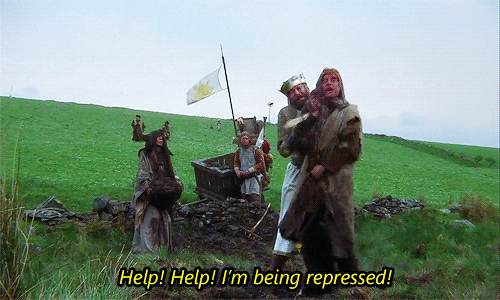
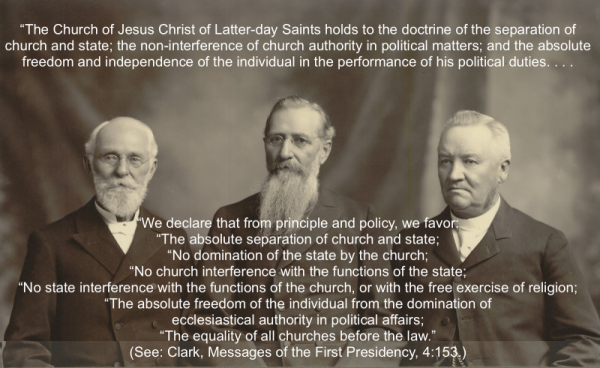



I agree with everything EXCEPT this:
"should not be forced against his or her conscience to do so, especially when others are readily available to perform that function."
This is the same reasoning behind "I don't have to teach people of color, they have their own schools."
You always do such a great job of background research and adding perspective. Great work Geoffrey.
Thanks Geoffrey.
i have a question: since many of the students who attend our LDS universities use Federal Financial Aid, does that “count” as the school using Federal funding? It would seem so to me…since a majority of their students could not probably afford to attend without the Federal assistance…
If so, should they not be subject to requirements to allow a little more freedom in some areas? (such as allowing students who withdraw from membership to continue to attend?) What am I not understanding?